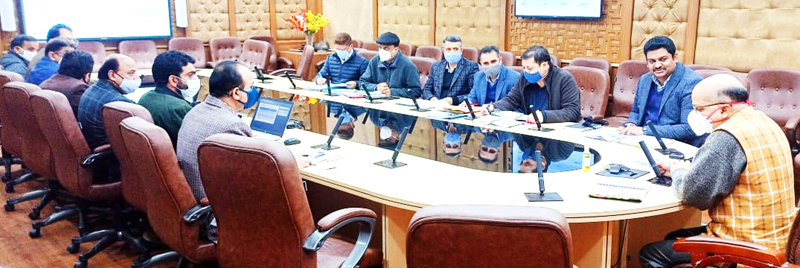J&K to facilitate Ease of Doing Business
*4 districts to have 100% piped water supply by April 2021
Excelsior Correspondent
JAMMU, Jan 12: Chief Secretary, B V R Subrahmanyam today chaired a meeting to review the progress made under Jal Jeevan Mission (JJM) to provide safe drinking water to all the rural population of Jammu and Kashmir.
Administrative Secretaries of Jal Shakti Department along with Chief Engineers of Jammu & Kashmir and concerned Executive Engineers participated in the meeting.
Secretary, Jal Shakti Department apprised the Chief Secretary that efforts are underway to utilize the existing skillsets of departmental experts to achieve faster execution of projects in six districts namely Reasi, Samba, Poonch Pulwama, Bandipora, and Shopian.
It was informed that under Phase I, universal tap water coverage has been achieved in the districts of Srinagar and Ganderbal, whereas works in the districts of Reasi and Samba are underway and will be completed shortly. It was further informed that the department is aiming to provide Functional Household Tap Connections (FHTCs) to approximately 9.8 lakh households by March 2021.
Moreover, works are being taken up on a war footing to install the required infrastructure in four quality affected habitations of which 2 have been completed so far; drought-prone areas, Sansad Adarsh Gram areas and SC/ST majority areas. Additionally, 4038 ‘Pani Samitis’ have been constituted at Panchayat level across Jammu & Kashmir for effective monitoring of project implementation under JJM.
The department is also in the process of finalizing the skill development strategy to train 6400 personnel in masonry, plumbing, electricity, fitting, and other skill sets.
For fast-tracking the project execution under Phase-II of JJM, Chief Secretary impressed upon the department to right away initiate the process of tendering for works and ensure adherence to project timelines. Simultaneously, the department was advised to expedite engaging ‘Project Development and Management Consultant’ (PDMC), one each for Kashmir and Jammu province, which will supervise project execution, contract & project management and bill verification in the remaining districts to be taken up under Phase II & III.
The Chief Secretary maintained that coordinated efforts must be put in place to achieve the target of providing every rural household with Functional Household Tap Connection (FHTC) under Phase-II by 30th September, 2022 and Phase-III by December, 2022.
Phase II will provide universal drinking water connections to 9 districts of Bandipora, Doda, Jammu, Kulgam, Kupwara, Poonch, Pulwama, Shopian, and Udhampur, whereas, phase III will cover 7 districts of Anantnag, Budgam, Baramulla, Kathua, Kishtwar, Ramban, and Rajouri.
Meanwhile, Chief Secretary, chaired a meeting to review the measures to be taken for easing the business establishment process in Jammu and Kashmir.
Administrative Secretaries of departments of Revenue, Animal/Sheep Husbandry & Fisheries, Power Development Department, Industries & Commerce, Forest, Ecology & Environment, Labour & Employment, and Jal Shakti, besides Secretary, Pollution Control Board (PCB) and concerned HoDs participated in the meeting.
It was informed that currently entrepreneurs face various challenges at the pre-establishment stage in acquiring various NOCs and clearances through a cumbersome process which has retarded the growth of industries in Jammu & Kashmir.
To ease the business establishment process in J&K, the Industries & Commerce Department proposed a reduction of compliance burden by doing away with certain NOCs, while relaxing several pre-requisite approval/clearances for initial 2 years.
Emphasizing the importance of a pro-active engagement by the Industries & Commerce department, Chief Secretary urged the Department to promptly and proportionately reduce the registration-related documentation required for setting up Red, Orange, Green & White categories of business units inside the designated industrial estates.
Chief Secretary also advised the department to bring a proposal for providing interim permission/provisional registration to entrepreneurs on the basis of a few essential clearances including ‘consent to establish’ from the Pollution Control Board, whereas the rest can be obtained within a period of 2 years. Additionally, PCB was also asked to enhance the validity of ‘consent to establish’ from the existing 1 year to 3 years.
Further, Chief Secretary asked the I&C Department to nominate SIDCO as the Nodal Agency for grant of permissions related to electricity, water, sewerage connections to the units being established inside industrial estates. For a periodic review of grant of these permissions, a committee chaired by the General Manager, District Industries Centre and respective Manager Estates, SIDCO was asked to be put in place.


